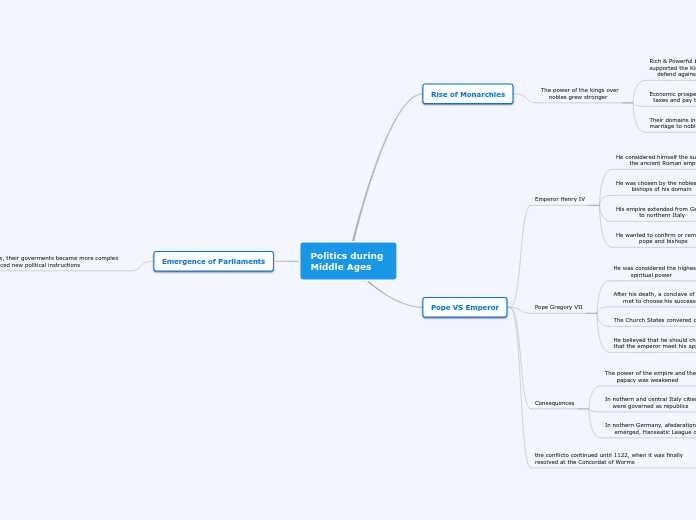Politics during
Middle Ages
Rise of Monarchies
The power of the kings over
nobles grew stronger
Rich & Powerful bourgeosie from cities
supported the King so in turn he would
defend against the feudal lords
Economic prosperity alllowed kingd to levy
taxes and pay the armies and officials
Their domains increased in size as a result of war and marriage to nobles and members of the monarchies
Pope VS Emperor
Emperor Henry IV
He considered himself the successor of
the ancient Roman emperors.
He was chosen by the nobles and
bishops of his domain
His empire extended from Germany
to northern Italy
He wanted to confirm or remove the
pope and bishops
Pope Gregory VII
He was considered the highest
spiritual power
After his death, a conclave of cardinals
met to choose his successor
The Church States convered central Italy
He believed that he should choose the bishops and demanded that the emperor meet his approval to rule
Consequences
The power of the empire and the
papacy was weakened
In nothern and central Italy cities
were governed as republics
In nothern Germany, afederation of trading cities
emerged, Hanseatic League or Hanssa
the conflicto continued until 1122, when it was finally resolved at the Concordat of Worms
Emergence of Parliaments
As kingdoms grew, their goverments became more complex and kings introduced new political instructions
Characteristics
They represented all inhabitants.
Only most powerful attended
They were advisory, they could only give
the King their opinion
They met when convened by the king
Functions
To swear loyalty to the King or his successor. this was crucial in case of a problema with the succession to the throne
To approve new taxes and aid. The taxes were
levied on the bourgoisie.
To finance the monarchy
To support on any foreign policy measure
